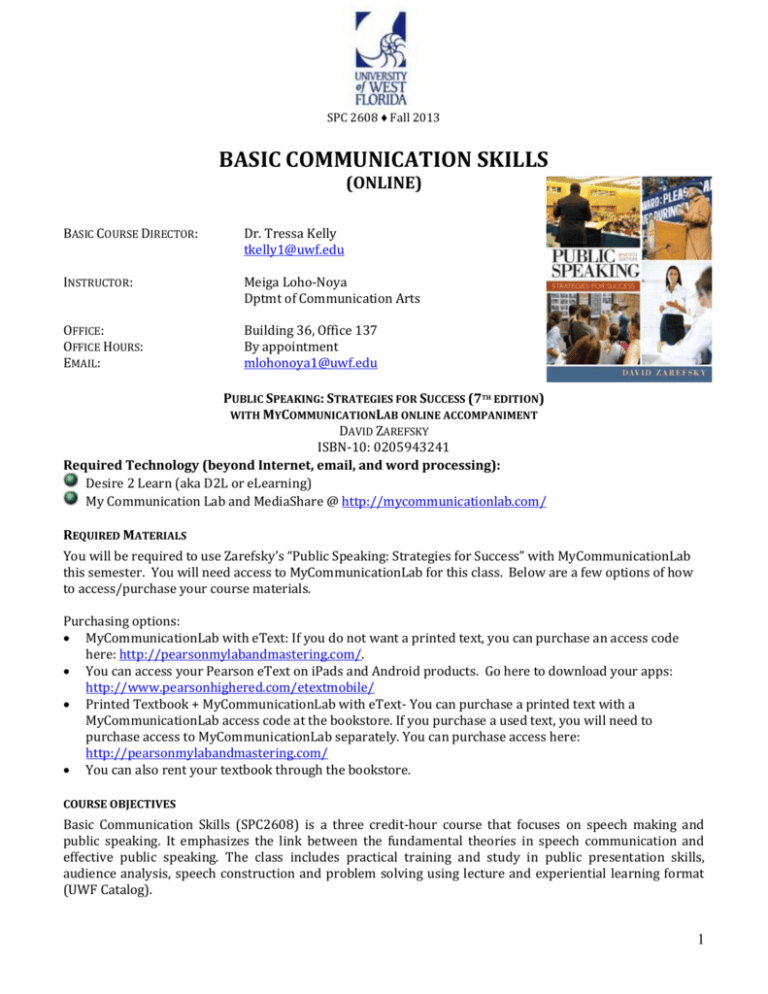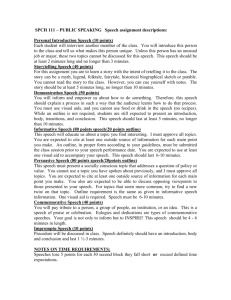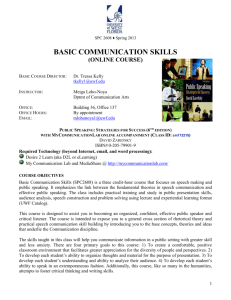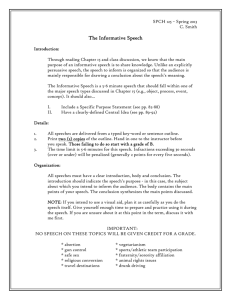SPC 2016: BASIC COMMUNICATION SKILLS
advertisement

SPC 2608 ♦ Fall 2013 BASIC COMMUNICATION SKILLS (ONLINE) BASIC COURSE DIRECTOR: Dr. Tressa Kelly tkelly1@uwf.edu INSTRUCTOR: Meiga Loho-Noya Dptmt of Communication Arts OFFICE: OFFICE HOURS: EMAIL: Building 36, Office 137 By appointment mlohonoya1@uwf.edu PUBLIC SPEAKING: STRATEGIES FOR SUCCESS (7TH EDITION) WITH MYCOMMUNICATIONLAB ONLINE ACCOMPANIMENT DAVID ZAREFSKY ISBN-10: 0205943241 Required Technology (beyond Internet, email, and word processing): Desire 2 Learn (aka D2L or eLearning) My Communication Lab and MediaShare @ http://mycommunicationlab.com/ REQUIRED MATERIALS You will be required to use Zarefsky’s “Public Speaking: Strategies for Success” with MyCommunicationLab this semester. You will need access to MyCommunicationLab for this class. Below are a few options of how to access/purchase your course materials. Purchasing options: MyCommunicationLab with eText: If you do not want a printed text, you can purchase an access code here: http://pearsonmylabandmastering.com/. You can access your Pearson eText on iPads and Android products. Go here to download your apps: http://www.pearsonhighered.com/etextmobile/ Printed Textbook + MyCommunicationLab with eText- You can purchase a printed text with a MyCommunicationLab access code at the bookstore. If you purchase a used text, you will need to purchase access to MyCommunicationLab separately. You can purchase access here: http://pearsonmylabandmastering.com/ You can also rent your textbook through the bookstore. COURSE OBJECTIVES Basic Communication Skills (SPC2608) is a three credit-hour course that focuses on speech making and public speaking. It emphasizes the link between the fundamental theories in speech communication and effective public speaking. The class includes practical training and study in public presentation skills, audience analysis, speech construction and problem solving using lecture and experiential learning format (UWF Catalog). 1 This course is designed to assist you in becoming an organized, confident, effective public speaker and critical listener. The course is intended to expose you to a general cross section of rhetorical theory and practical speech communication skill building by introducing you to the base concepts, theories and ideas that underlie the Communication discipline. The skills taught in this class will help you communicate information in a public setting with greater skill and less anxiety. There are four primary goals to this course: 1) To create a comfortable, positive classroom environment that facilitates greater appreciation for the diversity of people and perspectives. 2) To develop each student’s ability to organize thoughts and material for the purpose of presentation. 3) To develop each student’s understanding and ability to analyze their audience. 4) To develop each student’s ability to speak in an extemporaneous fashion. Additionally, this course, like so many in the humanities, attempts to foster critical thinking and writing skills. STUDENT LEARNING OUTCOMES 1. Student will be able to, following the study of language, to understand the relationship between words and meanings, and to identify factors that contribute to a speaker’s effective or ineffective use of language. 2. Students will be able to better control their nonverbal output as a speaker, following the study of physical presentation strategies and practice. 3. Students will be able to construct and compose speech outlines that are appropriate to the context and occasion. 4. Students will be able to perform public speeches in an extemporaneous fashion. 5. Students will be able to organize and synthesize information for public presentation following the study of topics such as: 1) organizing a speech 2) utilizing appropriate supporting material, 3) composing appropriate introductions and conclusions, 4) and utilizing appropriate visual aids. COURSE POLICIES 1) ASSIGNMENT SUBMISSION: All written work must be submitted in my Digital Drop box within the D2L system (a.k.a. eLearning). Assignment submissions are given a time stamp within that system, so it will be clear as to when an item was submitted (both for the instructor and student). Work will not be accepted after the assigned deadline. 2) WRITTEN WORK: All written work should meet the following conditions: Follow APA format. The following website contains an article (with links) that breaks down the style manual to the essential components for this course (i.e. 12 point Times or TNR font, 1-1.25” margins, title page, abstract, reference page, etc.). If you are interested APA has a complete style manual (available in the library, online and at all the local bookstores) and several websites are available to assist you in navigating the style format. http://www.vanguard.edu/faculty/ddegelman/index.aspx?doc_id=796 All written work must be submitted in my digital drop box in D2L on the day the assignment is due. Upload your work as a Word or PDF document. The evaluation and assessment of written work will include spelling, grammar, sentence and paragraph structure and style. All written work will be held to college level expectations. 2 PROOFREAD THOROUGHLY BEFORE SUBMITTING WORK! If the written component of any assignment does not meet the minimum expectation for college level writing you may be encouraged to visit the writing lab. 3) SPEECHES: There are four required speeches in this course. Each student needs to complete all four to pass the class. Speeches should be recorded and submitted via Media Share @ My Communication Lab: http://vut.pearsoncmg.com/user. Audience: You are required to deliver every speech you submit in front of a small audience that you gather yourself. Your audience should be composed of at least four adults (they should be an attentive audience: no reading or working on a laptop while listening). Your audience must be evident during at least part of the recording. Speeches delivered to an incomplete or missing audience will not be graded. Video recording guidelines: o It is important that you show the audience members (prior to speaking at a minimum). Use a swiping motion to transition from the audience to the speakers. Videos with cuts and editing will not be graded. o I want to see your body language and facial expression. Make sure the camera focuses on you and that the lighting is sufficient for me to see your eye contact, facial expressions, hand gestures, body movement, etc. You can use a wider shot if you are using a visual aid, but I do not want to see only the visual aids and not the speaker. o Don't be afraid to move while on camera. While nervous movement is bad, some movement is good! This might require some help to run the video camera. o Make sure the volume is adequate and speak loudly if necessary. I need to be able to hear you throughout the speech. o Consider your background. Simple is best. Speaking in front of bare walls or curtains works well. Wear a color that contrasts rather than blends with your background. Also, make sure you look professional…you would not give a speech barefoot in a classroom setting. Don’t do it online either! 4) ONLINE PARTICIPATION EXPECTATIONS: Online Discussions: Participation will be assessed in terms of quality and quantity of readership and authorship. You are expected to play a significant role in the online exchange. If your classmates post messages read them; involve yourself in the discussion as though we were in a classroom together. Responses to posted messages should reflect a sense of depth, thoughtfulness and consideration for the question (the message to which you are responding). You will be exposed to many divergent views during this class. Please respect everyone’s point of view, even if it is contrary to your own. You don’t have to agree with everyone, but you do have to be willing to listen. Online Content Consumption: You will be expected to consume the online material (PowerPoint lectures, articles, websites, etc) made available to you. Your online activity will be assessed through assignments and exams. Email: Check your email frequently (at least once per day). Deadlines: All speech assignments will be due on the Wednesday of the week that they are assigned to allow for feedback from classmates. All other assignments will be due at the end of each time frame (Friday). All assignments are due by 11:59 pm EST on the day of the deadline. 3 Generally speaking, you will find that the online learning setting provides you a much more liberal schedule for assignment completion and participation than the traditional classroom. Warning: Be sure not to save all your online participation for the very end of a time frame. Progressive involvement is key. I would suggest checking into the eLearning classroom everyday in order to make a contribution to the classroom conversation, project, or challenge. If you have three days to complete a discussion and don’t get involved until the last two hours, two things will occur. First, you will have limited your ability to contribute to the class discussion experience (as well as your own) and second, you will have provided clear insight into the regard you have for this module of the course (thus, impacting final grade). Advice: stay involved online…frequently! The only way to consistently make deadlines is to work ahead of them. You should check D2L and online resources at least 24 hours in advance. It is not an acceptable excuse to say your work is late because the computer lab was closed or the D2L system was down. 5) EXPECTATIONS FOR ACADEMIC CONDUCT/PLAGIARISM POLICY: As members of the University of West Florida, we commit ourselves to honesty. As we strive for excellence in performance, integrity— personal and institutional—is our most precious asset. Honesty in our academic work is vital, and we will not knowingly act in ways, which erode that integrity. Accordingly, we pledge not to cheat, nor to tolerate cheating, nor to plagiarize the work of others. We pledge to share community resources in ways that are responsible and that comply with established policies of fairness. Cooperation and competition are means to high achievement and are encouraged. Indeed, cooperation is expected unless our directive is to individual performance. We will compete constructively and professionally for the purpose of stimulating high performance standards. Finally, we accept adherence to this set of expectations for academic conduct as a condition of membership in the UWF academic community. A full statement of the plagiarism policy is provided at http://uwf.edu/cassupport/insupport/Plagiarism.rtf Academic dishonesty will not be tolerated, and will result in a lowered or failing grade for the assignment or the course, depending on the situation. Academic dishonesty includes: Using material without appropriately citing its source (doing this will result in a considerably lowered grade on the assignment) Cheating on an assignment or exam (results in a failing grade in the course) Interfering with another student's learning (after one warning, this will result in a failing grade in the course). PLAGIARISM WARNING If you use the words or ideas of someone else, you must cite the original source of information in your written and spoken work. If you do not cite your sources, you will be plagiarizing. Copying someone else’s words or ideas without giving that person credit is a very serious offense. If I suspect you have done so, I will ask to see the sources of your information and you will not receive a grade until I have verified the source of every idea in question. If you have copied someone else’s words or ideas without giving appropriate credit, I will send your case to the Academic Standards Committee. They may choose to fail you in the course or suspend or expel you from school. Notes: Any use of scholarly sources must be 1) cited verbally in the speech, 2) noted in a reference page, and 3) cited in the outline (in the approximate place where it is utilized in the speech. UWF maintains a university license agreement for an online text matching service called Turnitin. At my discretion I will use the Turnitin service to determine the originality of student papers. If I submit 4 your paper to Turnitin, it will be stored in a Turnitin database for as long as the service remains in existence. If you object to this storage of your paper: o You must let me know no later than two weeks after the start of this class. o I will utilize other services and techniques to evaluate your work for evidence of appropriate authorship practices. 6) GRADE COMPLAINTS: Complaints about grades must occur within one week after you receive the grade. Complaints must be given to the instructor in writing in order to receive consideration. Include a printed copy of your original assignment (with instructor evaluation) with your grade complaint or it cannot be reevaluated. 7) SPECIAL NEEDS: The Student Disability Resource Center SDRC at the University of West Florida supports an inclusive learning environment for all students. If there are aspects of the instruction or design of this course that hinder your full participation, such as time limited exams, inaccessible web content, or the use of non-captioned videos and podcasts, please notify the instructor or the SDRC as soon as possible. You may contact the SDRC office by e-mail at sdrc@uwf.edu or by phone at (850) 474-2387. Appropriate academic accommodations will be determined based on the documented needs of the individual. GRADING Final grades are based on an absolute point total. A student's final grade is a function of the number of points earned in the course divided by the total number of points yielding a percentage. Each assignment will be awarded a point value. The division of points received to points available will determine a letter grade for an assignment. For instance, if an assignment is worth 100 points and the grade received is 85, then the corresponding letter grade would be a B. GRADING SCALE A A- 94-100% 90-93% B+ B B- 87-89% 84-86% 80-83% C+ C C- 77-79% 74-76% 70-73% D F 65-69% <64% COURSE REQUIREMENTS ONLINE PARTICIPATION AND ACTIVITIES PEER FEEDBACK ON SPEECHES ONE-POINT SPEECH INFORMATIVE SPEECH PERSUASIVE SPEECH COMMEMORATIVE SPEECH EXAMS 25 POINTS 25 POINTS 100 POINTS 200 POINTS 250 POINTS 150 POINTS 300 POINTS TOTAL 1050 POINTS 5 Tentative Schedule (Please note that this schedule is still being revised and dates are subject to change. Readings and assignments, however, should remain fairly the same.) Week Aug 26-30 Aug 31-Sept6 Sept 7-13 Sept 14-20 Sept 21-27 Sept 28-Oct 4 Oct 5-11 Oct 12-18 Oct 19-25 Oct 26 – Nov 1 Nov 2-8 Nov 9-15 Nov 16-22 Nov 23-29 Nov 30 – Dec 6 Dec 7-12 Topics covered Introduction & Course Overview Review of syllabus Welcome to Public Speaking – Preparing your first speech Presenting the speech Review One-Point Speech Assignment Listening Critically Analyzing your audience Choosing a Topic and Developing a Strategy ONE-POINT SPEECHES (due 9/18) Informative Speeches Review Informative Speech Assignment Researching the Speech Reasoning MIDTERM EXAM Organizing the Speech: The Body Introductions, Conclusions and Transitions Outlining Speaking with Visual Aids INFORMATIVE SPEECHES (due 10/16) Persuading Review persuasive speech assignment Persuading Work on Persuasive Speech PERSUASIVE SPEECHES (due 11/6) Special Occasion Speeches Review Commemorative Speech Assignment Using Language to Style the Speech Vocal and Nonverbal Delivery Work on Commemorative Speech COMMEMORATIVE SPEECHES (due 11/27) Semester wrap up FINAL EXAM Reading Assignment Ch 1 Ch 2 Ch 3 Ch 4 Ch 5 Ch 6 Ch 13 Ch 7 Ch 8 Ch 1-8 Ch 9 Ch 10 Ch 11 Ch 15 Ch 14 Ch 14 (continued) Ch 16 Ch 12 Ch 3 (review) Ch 9-16 6 DESCRIPTION OF ASSIGNMENTS AND REQUIREMENTS Guiding Principles There are four assigned speeches. All speeches must be given in order to complete the course. The four speeches are designed to emphasize the processual aspect of the canons of rhetoric by introducing different skill sets as the semester develops. This course considers the canons of rhetoric to be building blocks. You will incorporate a new set of speech skills with each speech building up to the final speech, which incorporates all five rhetorical canons. Accompanying each speech will be an outline, reference page (except speech 1) and an audience analysis. The outline should be a complete sentence outline. The sentence outline is preferred over other styles because it shows advanced preparation and reflects our commitment to extemporaneous delivery. You should not write the speech out word for word. Additionally, your note cards should reflect key words and phrases to continue making the speech more extemporaneous. For the reference page, you are required to use APA. An audience analysis statement is required with each speech. Many of the classroom activities are designed to foster stronger and more insightful audience analysis. Each speech should be developed with your particular audience in mind. This makes the audience feel as if they are significant to the speaker and allows the speaker to hone in on specific points, which will catch your audience’s attention. As you are choosing your speech topic, consider your audience. What do you know about them? What do they know about the topic? What are your audience’s attitudes, interests, goals and knowledge? How can you make your topic of interest or value to the audience? Once you have considered the relationship between your topic and audience, you can begin to construct your presentation. Remember to narrow your topic and purpose to fit the constraints of the situation. Consider support (personal experiences, examples, observations, statistics, etc.) that will contribute directly to your main idea (thesis). Assignments in this class will build upon each other, so it’s important that you devote the time to understand each one. You will slowly begin to see how the principles and skills applied in one contribute to the next assignment. **See eLearning for detailed instructions, evaluation criteria, and Sample Outline Formats.** One-point Speech – Audience Analysis and Purpose 100 points (50outline/50presentation) Topic: Culture Exploration 2-3 min The first speech is a one point informative speech that emphasizes one aspect of your culture. This speech highlights the canon of invention by focusing on finding a topic, analyzing the audience and developing a clear specific purpose. Think about culture broadly. While ethnicity is part of culture, it is only one dimension. Consider: group memberships, roles you play (athlete, student), lifestyle (vegetarian, sexuality), race, nationality, gender, etc. Informative Speech – Organizing, Outlining and Using Visual Aids 200 points (100/100) Topic: Related to a Social Issue of your choice (instructor’s approval) 5-6 min For speeches two and three, you should talk on the same topic. Speech two is an informative speech. This speech adds the canon of arrangement by focusing on organizational skills such as outlining, choosing an organizational structure, and incorporating evidence. Since this speech is linked to speech three, you need to choose a topic that is persuasive in nature. Speech two provides information in order to raise awareness and increase understanding on the topic. Speech two requires a power point presentation to accompany the speech. 7 Persuasive Speech – Persuasion 250 points (125/125) Topic related to Informative Speech 7-9 min Speech three is the same topic discussed in speech two. This speech, however, is a persuasive speech. The speech should be a question of policy, arguing for clear and appropriate solutions for the target audience in addition to the general audience. You will need to develop a cohesive and complete argument for your position. Commemorative Speech – Language, Oral Delivery and Physical Delivery 150 points (75/75) Topic: Commemorate something or someone you know (instructor’s approval) 5-7 min Speech four is a commemorative speech designed to honor, pay tribute to someone or something important in your life (grandmothers, best friends, favorite pets, favorite coaches, summer camps, etc.). The only requirements are that you have a personal relationship with the topic (not an athlete looked up to from afar) and that the speech be positive in nature. This speech incorporates the canons of style, memory, and delivery. It should rely heavily on the use of narratives and examples as supporting materials. Look for evidence in creative ways. A personal interview is required for one source. Other sources could stem from literature, poetry, music, non-fiction books, etc. The delivery style should be conversational, uplifting and inclusive to the audience with an emphasis on storytelling. Basic Communication Skills is designated as a General Studies course. The General Studies curriculum at the University of West Florida is designed to provide a cohesive program of study that promotes the development of a broadly educated person and provides the knowledge and skills needed to succeed in university studies. This course has been approved as meeting your requirement in the Contemporary Values & Expressions area. The major General Studies learning outcomes for this course are Communication and Critical Thinking. If you are interested in a major in Communication you should contact the Department of Communication Arts in the School of Fine, Performing and Communication Arts at 850-474-2874. If you are undecided about you major you should contact your academic advisor or the Career Center at 850-4742254. 8





